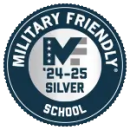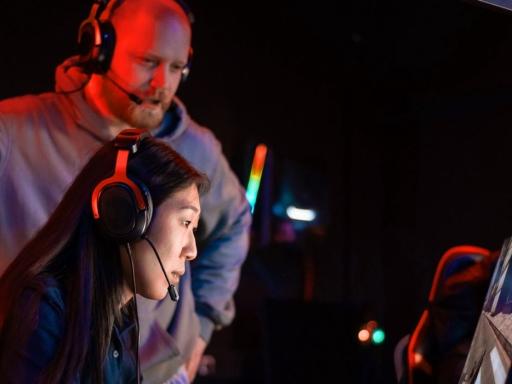Take ESPT-110.
Begin Your Career in the Competitive Gaming Industry
Launch your career in the world of competitive gaming with Champlain College Online's (CCO) Associate of Science in Esports Management. This 60-credit program combines business fundamentals, team management strategies, and communication skills specific to the esports ecosystem. Designed for those passionate about gaming and business, this degree provides the practical knowledge needed to work with esports teams, events, and marketing, or continue your education with a Bachelor's Degree in Esports Management.
Finish your program faster with credit for prior learning and experience.
Differentiate your degree and get your resume noticed with a certificate. Speak with your advisor for information.
Develop An Essential Esports Management Foundation
- Industry Ecosystem Understanding: Gain comprehensive knowledge of esports structure, key stakeholders, revenue models, and the esports business environment.
- Team Management Principles: Learn practical approaches for recruiting, developing, and managing competitive esports teams while balancing player needs with organizational goals.
- Marketing and Community Building: Explore strategies for developing fan engagement, building communities, and creating effective promotional campaigns specific to esports audiences.
- Legal and Ethical Framework: Understand the complex regulatory considerations, player agreements, intellectual property issues, and ethical challenges unique to competitive gaming.
- Communication Strategy: Develop skills in small group facilitation, organizational messaging, and media relations essential for coordinating teams and engaging with fans and sponsors.
- Business Operations: Apply core management concepts to the unique operational challenges of esports organizations, from event planning to revenue generation.
Note: All programs, undergraduate and graduate, must be submitted individually to the Department of Veterans Affairs for review and approval before students can utilize their G.I. Benefits to pay for them. This program is currently awaiting approval. To learn more about the process, visit the VA School Program Approval page on the VA website. If you have any questions, please feel free to contact your enrollment coach or email us at onlineadmissions@champlain.edu
Program Curriculum
Learn more about Champlain's 100% online esports management associate degree, designed for the modern learner.
Marketing Foundation 30 Credits
General Electives 9 Credits
General Education 21 Credits
This course offers an overview of esports' history, evolution, and current trends, emphasizing its ties to traditional sports and the wider entertainment industry. Students will delve into aspects of esports management such as team coordination, event planning, marketing, branding, and media relations. By the course's conclusion, students will possess a thorough grasp of the esports ecosystem, equipped to apply management principles in areas like team leadership and business growth.
Legal and ethical adherence is vital in esports. In this course, students delve into the legal frameworks such as contracts and intellectual property, coupled with ethical issues like fair play and player welfare in esports. With an emphasis on best practices, students will learn to integrate integrity and compliance into esports management. The course also highlights the evolving legal landscape in esports. By the end of the course, students will be equipped to ensure both legal and ethical adherence in esports ventures.
Prerequisites
In the rapidly evolving world of esports, the ability to build and manage a successful team is a skill that combines knowledge of gaming culture, business acumen, and leadership. This advanced course, designed for students with a foundational understanding of the esports industry, delves deep into the nuances of creating and sustaining a competitive esports team.
Prerequisites
Take ESPT-110.
The perspectives, beliefs, and preferences of employees in today's workplace are more diverse than perhaps ever before. Today's high-performing managers are those who foster inclusive, positive, and responsive organizational cultures for their people. But with such varied perspectives, what cultural considerations make the most sense for an organization? Management in the 21st Century will teach students how to foster a workplace environment where people can flourish and are motivated to meet objectives and ambitions for the organization.
Students will learn about the application of positive individual and group strengths and capacities that can be recognized, evaluated, and expanded to advance organizational well-being. This course encourages students to apply positive organizational behavior processes to everyday challenges organizations face to drive positive workplace behaviors and outcomes. This course also helps students to practice and gain skills, knowledge, and competencies to become positive and impactful leaders and change-makers from whatever position they hold.
This class is designed to provide students who have little or no digital video production knowledge with an introduction to methods and strategies for production of digital video stories. Using the art of telling a story, the class will create educational, informational or personal experience video productions utilizing audio, video, storyboard, scriptwriting and digital editing techniques
This course is an historical overview, and examination of the evolution of digital, film, and print media, and their functions. Students will identify and analyze contemporary problems of the media such as the legal, social, economic and psychological implications of their relationships with society. They also will examine the ways in which marketing and PR professionals utilize the mass media channels to reach their intended target audiences.
This course explores the purpose and practice of public relations (PR) in today's media environment. Students learn how organizations use PR to communicate with various audiences, build relationships, and manage public perception. The course emphasizes the role of messaging, media channels, and ethical considerations in shaping public understanding. Through case studies, media analysis, and hands-on projects, students develop foundational skills in identifying PR strategies, crafting clear messages, and understanding the impact of PR on organizations and society.
This course introduces the core terminology and principles of marketing. Students learn about the marketing mix (product, price, place, and promotion), market segmentation, and how external factors such as the economy, technology, culture, and competition influence marketing decisions. The course also examines how marketing fits within an organization and contributes to business success, along with how ethical considerations, cultural awareness, global trends, and social responsibility shape marketing practices across industries. No prior business experience is required.
This course examines the principles of effective small group interaction. Students will analyze group development stages and small group roles. They will identify and evaluate communication skills that enhance small group cohesion and problem-solving. Students will explain how conflict affects group processes and compare face-to-face versus digital collaboration environments. These skills prepare students to participate effectively in group settings across academic, professional, and community contexts.
This course introduces students to the foundational concepts needed to communicate effectively in writing for academic study and professional development. Students will also learn to read critically to evaluate an author's message. Students will be introduced to rhetorical modes and their role in the development of written communication. Students will also learn how to use revision strategies to create written communication that meets its intended purpose for its intended audience
This course builds on students' proficiency in the writing process and rhetorical modes to introduce the use of sources in written communication. Students will practice information literacy as they learn to determine information needs from sources, develop effective search strategies, and incorporate sources in written communication, legally and ethically.
Prerequisites
Complete ENGL-100
Starting with a frame of human communication as a dynamic system of interactions in which people make choices that impact their relationships, other people, and themselves, students will define theory-informed communication concepts and processes, and critically examine how they apply to everyday life across a variety of contexts. Students will reflect on how the theory, concepts and processes apply to their own lives in becoming competent communicators who are knowledgeable, skilled, and versatile.
Students will learn and apply critical inquiry skills to analyze persuasive communication created by others and to develop persuasive communication/arguments of their own to solve problems in professional, civic, social, and personal contexts. Specifically, students will learn to recognize fallacies in logic; apply inductive and deductive reasoning strategies to the interpretation and development of persuasive communication; evaluate the validity of sources; and develop logically sound persuasive communication. Students will explore the roles of self-awareness, empathy, and ethics in the context of critical inquiry and the development of arguments.
Prerequisites
Complete ENGL-110.
This course introduces students to basic statistics for data literacy. With a focus on exploring real-world data, students will interpret numerical information and utilize the tools necessary to complete the entire statistical process: designing a study; gathering, organizing, and analyzing sample data; and making inferences about a population. Students will demonstrate data-driven decision-making and effective communication of numerical data.
Students will develop the ability to apply scientific methods to understand the natural world, to identify scientific aspects of daily life, and to evaluate the quality of scientific information based on its source and the methods used for its generation.
In this course, students will gain an introduction to classical mechanics and learn about motion, force, energy, and momentum. The course covers vectors, scalars, and coordinate systems, as well as kinematics in one and two dimensions, Newton's Laws of Motion, circular motion, and kinetic energy and work. Students also learn about potential energy and energy conservation, collision theory, rotational motion, moment of inertia, torque, rotational dynamics, and angular momentum.
With pressure and release, a window opens and closes, recording light on a sensor. The simple action captures the instinct, judgement, and skill of the person behind the lens. This class will begin a study of the art and craft of photography. Students will develop their vision and their understanding of how to achieve it. Solid skills will be learned and many doors will be opened.
A survey of the continuing change experienced in art since the 15th century. Students will examine how an image is achieved as well as the significance of the subject represented. Individual inquiry concerning the nature of art is encouraged.
Students learn to appreciate films through the critical analysis of various elements of mise-en-scene, cinematography, editing and sound. The course introduces the conventions of classical Hollywood cinema, considers the work of one major director (auteur), and surveys selected international and independent films. Students view and discuss films each week.
Students in the course will explore the cultural history of the music genre broadly referred to as rock. Students will explore the social, economic and political contexts that are influenced by and that influenced each style in the United States. By listening, watching, reflecting upon, discussing and writing, students will explore how music takes on meaning, personally, and culturally. Topics and themes include the relationships between and among gospel, country, funk, folk, disco, rap and hip hop; the role of business and technology in those relationships, and political or transgressive elements of rock music.
This course empowers students with essential habits of mind for success in higher education and beyond. From a questioning mindset, students will explore informed decision-making and creative problem-solving; connecting personal values and discipline-specific ethical frameworks to various contexts. Students will learn the importance of communication to enhance collaboration to support integrated decision-making processes in diverse settings. This course provides a strong foundation for academic achievement and personal growth, valuable for all students regardless of their background or future aspirations.
Students will learn how to create conditions for successful conflict engagement, a necessary skill for any professional. The course focuses on the foundational capacities to remain calm and connected with oneself and others. In this state students can access helpful ideas and responses and be their best selves regardless of environment. Improving facility for conflict creates stronger relationships and reduces fear. By the end of the course, students will understand that disagreement and difference can become a source of personal and interpersonal growth.
In this course, students will explore and apply writing principles and techniques to effectively interpret and write technical workplace materials. Students will enhance and gain skills to communicate business and technical information by producing instructions, describing processes, applying document design elements, creating and integrating illustrations, researching and writing proposals and formal reports, and presenting content for decision-makers.
This course provides students with a comprehensive overview of the American criminal justice system as comprising three essential components: law enforcement, the court system and corrections. Students will recognize that the field of criminal justice is interdisciplinary and they will outline and discuss the historical foundation of the criminal justice system. They will also explore social and ethical dimensions as they review real-world case studies.
This course introduces students to the fundamentals of substantive criminal law. With this foundation for understanding the legal system students will identify the essential elements of crimes, including the criminal act, criminal state of mind, and jurisdiction. They will examine the rationale underlying criminal law, factors affecting criminal responsibility, and legal defenses. By analyzing real-world scenarios, students will develop skills to distinguish lawful from unlawful actions and prepare for advanced studies or careers in criminal justice.
This course focuses on the rules and procedures governing how the American criminal justice system must process individuals suspected, accused, and convicted of law violations.
In this course, students will explore the theory and fundamentals of criminal investigation, emphasizing practical applications for evidence handling and case development. Students will review basic responsibilities of investigators and protocols for report writing, evidence collection, and preparation of cases for trial. The curriculum examines investigative approaches for various crime categories, including violent offenses, property crimes, terrorism, and hate crimes, while introducing comparative perspectives from diverse legal systems.
Prerequisites
Take CRIM-120.
Students will study important themes in the social history of the United States since the Civil War. This course allows students to expand their critical thinking skills through an examination of primary and secondary sources. Themes might include: the evolving status of women; the immigrant experience; the concept of the American dream; the paradox of freedom vs. slavery; the minority experience; the tensions between social classes. Students will be evaluated primarily on writing assignments.
In this course, students will explore broad, foundational knowledge in psychology, including its history, major theorists and a survey of psychology subfields such as developmental, cognitive and social psychology. Students will also describe and assess the role of ethics and social responsibility in the study and application of psychological theory and practices.
In this class, students will explore how social relationships, groups, societies and culture develop and change over time. From a sociological theory foundation and employing the sociological imagination, students will examine the impact of social structures, institutions, and systems on individual lives. Students will apply sociological research methods to investigate sociological phenomena in their own lives.
Principles of Economics introduces the fundamental concepts of economics - the study of how people manage resources, and how they react to scarcity. This course focuses on both microeconomics (the behavior of consumers and companies) and macroeconomics (large-scale economic factors such as employment and interest rates), so that you'll gain a broad understanding of how a modern market economy functions, how decisions in business settings are informed by economics, and how economics applies to your everyday life.
Specific application of common tools for writing in the working world. Students will be instructed in rhetorical strategies of professional writing including style, report formats, editing, document design, and integration of visual aids. Students will complete a semester-long writing project; oral and written reports associated with the process of problem-solving within the project will be included.
Prerequisites
ENGL-112 or COR-125
Additional Program Details
- Identify key components of the esports industry, including its structure, audience, major stakeholders, and business management practices.
- Describe fundamental marketing and community engagement strategies used to build and maintain an esports fanbase.
- Explain ethical and legal considerations relevant to esports organizations, competition, and player management.
- Summarize the role of technology in esports and its impact on management decisions.
- Identify interpersonal, small group, organizational communication and management approaches relevant to esports management.
Design your own degree and enhance its value and focus by adding a certificate. Adding a certificate allows you to develop specialized skills, strengthen your résumé, and tailor your education to align with career goals. Choose from the undergraduate certificates on this page.
Note: To earn a certificate, you must speak with your advisor first. You must be officially enrolled in the certificate program before you complete the required courses in it — coursework completed prior to enrollment cannot be applied later, and certificates may not be added retroactively. Careful planning with an advisor is essential to ensure all policies and timelines are met.
Our admissions team seeks to admit students who:
- Demonstrate a solid academic foundation - a minimum 2.5 GPA is our recommendation, though exceptions may be made on a case-by-case basis for those who demonstrate a potential for academic success in other ways.
- Possess an aptitude for success in an online learning environment.
- Exhibit the ability to make a positive contribution to the Champlain College Online community.
To learn more about submitting transcripts, or requirements for home-schooled students, those educated abroad or returning students visit our Undergraduate Admissions page.
Our transfer credit evaluation team works hard to ensure you get the transfer credits you deserve, from a variety of sources including prior college credits, work experience and training, military training and experience, and more. Our goal is to help you graduate from Champlain College Online as quickly and affordably as possible. Visit our Transfer Credit Options page to learn more.
Champlain College Online's Esports Management faculty, led by Program Director Elaine Young, are expert practitioners in the field. Their industry expertise ensures that our curriculum is aligned with the needs of employers, and reflects the skills today’s game professionals need for success. Classes led by our seasoned experts will give you real-world insight into the world of gaming, and create a rich community of career-focused learning.
The online degree in Esports Management is designed to work closely with the Champlain College Esports program, providing students opportunities for experiential learning and hands-on experience tied to their course projects and assignments. Students can participate in internships, manage live events, and contribute to broadcasting, among other roles. They can also undertake research projects and create engaging online content. The program offers chances for students to build relationships with sponsors and participate in online community management, thereby applying what they've learned in a real-world setting and allowing them to build experience as they complete their education.
Tuition & Costs
Online Undergraduate Tuition Fall '25 - Summer '26
Tuition & Costs
Online Undergraduate Tuition Fall '26 - Summer '27
* Alumni is defined, for this tuition rate, as any degree program graduate from Champlain College or Champlain College Online.
** Veteran rate effective Spring 2025, not retroactive
See the undergraduate cost of attendance and fees here
Affordability and Paying For Your Education
We provide a number of options to make your online education affordable, including preferred tuition for alumni, associate degree graduates, community college graduates, and military.
What Can You Do With an Associate Degree in Esports Management?
The esports industry continues its remarkable growth trajectory, with the global market projected to reach $5.17 billion by 2029, creating diverse career opportunities in management and operations. According to the Bureau of Labor Statistics, marketing occupations will grow 8% from 2023 through 2033*.
*Sources: Bureau of Labor Statistics (BLS), Advertising, Promotions, and Marketing Managers | Statista Esports Market Forecast
Entry-Level Positions for AS in Esports Management Graduates:
- Team Operations Coordinator
- Event Coordinator
- Community Management Assistant
- Marketing Assistant
- Content Production Assistant

Academic Excellence and Recognition

Regionally accredited by the New England Commission of Higher Education

Designated as a Military Friendly School for our commitment to the military community
Ranked among the best by Tech Guide for game design and computer science

Named the among the best schools with accelerated bachelor's degrees by Intelligent.com
Meet the Program Director
Elaine Young, PhD
- Accounting (Certificates, A.S., B.S., M.S.)
- Analytics (Certificates, M.S. Programs)
- Business (Certificates, A.S.,B.S.,MBA)
- Digital Marketing (B.S.)
- Digital Marketing and Technology (M.S.)
- Digital Media (B.S.)
- Esports Management (B.S.)
- Finance (Certificates, A.S., B.S.)
- Healthcare (all programs)
- Human Resource Management
- Leadership (Organizational and Digital Transformation)
- Management Information Systems
- Marketing (M.S.)
- Marketing Analytics (M.S.)
- Marketing & Communication (B.S.)
- Marketing Management (B.S.)
- Positive Organization Development Certificate
- Positive Organizational Psychology & Development
- Project Management
- Public Administration
About
Dr. Elaine Young is the Program Director for all business programs, and Curriculum Innovation Faculty Lead, at Champlain College Online.
As chair, Dr. Young manages the faculty, curriculum, and assessment for undergraduate and graduate programs in the business programs as well as developing and teaching courses. As Curriculum Innovation Faculty Lead, Dr. Young supports creation of new curriculum offerings that serve both the needs of adults continuing their education and employers who need educational opportunities for their employees. Prior to her leadership role at Champlain College Online, Dr. Young has been part of the Champlain College community since 2000 as a professor and faculty advisor for traditional on-campus students. She is a HubSpot Educator and a Certified Appreciative Advisor.
Dr. Young has a Ph.D. in Organizational Management from Capella University, where her dissertation research examined technology use and adoption of college students. In addition, she holds an M.S. in Internet Strategy Management from Marlboro College, a B.S. in Communication and Public Relations from SUNY Brockport and an A.S. in Communication from Genesee Community College. Dr. Young has over ten years of experience in the Marketing and Public Affairs profession, specializing in nonprofits. She is the author of “Tuned-in Family: How to Cope, Communicate and Connect in a Digital World” (2014).

FAQs: Esports Management Associate Degree
With the esports industry experiencing massive growth over the past several years, professional gamers need the same kind of guidance as professional athletes and entertainers in their careers. The esports management associate degree at Champlain College Online can help you learn the fundamentals of managing, to help gamers make smart business decisions, build their fanbase, and execute other career-building strategies.
With Champlain College Online’s AS Esports Management program, you can become a manager for a pro gamer, work in esports marketing, event planning, on-air commentary, player coaching, and other related roles. When you contact us about this program, we can discuss your specific goals and interests.
This AS Esports Management program teaches current real-world knowledge and skills in a wide range of areas. Upon completion, you can have a strong understanding of the components of the industry as well as a clear idea of the path you want to pursue. Plus, this program is a great foundation for bachelor’s degrees that can lead you towards advanced-level roles.
The AS Esports Management is geared toward the business and management side of gaming, designed to help students develop business skills that translate into several types of careers. Courses teach industry structure, community engagement, ethical and legal considerations, and more. Just like live-action sports, there is much more to the world of esports than exciting gameplay.
You May Also Be Interested In
Get More Information about the Esports Management associate degree
Learn what you can expect from our online associate degree in Esports Management.

Download Program Guide
I acknowledge that, by clicking the "submit" button, I am giving my express written consent to Champlain College and its representatives to contact me about educational opportunities via email, text, or phone, at the phone number above, including my mobile phone, using an automatic dialer, or pre-recorded message. Message and data rates may apply. I understand that my consent is not a requirement for enrollment, and I may withdraw my consent at any time.






